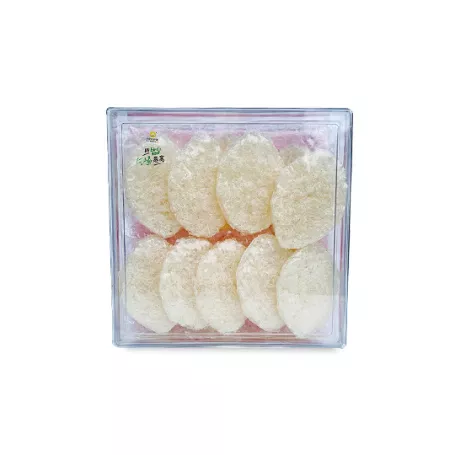What Is the Shelf Life of a Bird's Nest? I BaiZiGui

Bird's nest, a delicacy prized in many Asian cultures, is renowned for its health benefits and unique texture. However, like any consumable product, it has a shelf life that needs careful consideration to ensure its quality and safety. In this article, we’ll delve into the factors that influence the shelf life of bird's nest, the different types of bird's nest and their respective shelf lives, signs of spoilage, and ways to enhance its longevity and efficacy.
Understanding Bird's Nest Shelf Life
The shelf life of a bird's nest can be affected by various factors, including:
Storage Conditions
Temperature, humidity, and light exposure play crucial roles. Bird's nests should be kept in a cool, dry place, away from direct sunlight and high humidity, which can cause them to spoil faster. The optimal storage temperature is below 25°C (77°F), and relative humidity should be kept below 70%. Using silica gel packets in storage containers can help maintain low humidity levels.
Processing Methods
The way bird's nests are processed—whether they are raw, cleaned, or cooked—greatly influences their shelf life. Raw nests contain natural preservatives that can help them last longer, while cleaned nests have had these natural barriers removed, making them more susceptible to spoilage. The cleaning process involves soaking and removing impurities, which can inadvertently introduce moisture, thus reducing shelf life if not dried properly.
Packaging
Airtight and moisture-proof packaging can significantly extend the shelf life of bird's nests. Using vacuum-sealed bags or containers can protect the nests from environmental factors that cause deterioration. Packaging should also be opaque to shield the nests from light, which can degrade their quality over time. Double-bagging and using food-grade containers can provide additional protection against contamination.
Purity and Quality
Higher quality bird's nests, which are less contaminated and have fewer impurities, generally last longer. Premium grade nests are less likely to harbor bacteria or mold, which can hasten spoilage. Ensuring the nests are sourced from reputable suppliers can also contribute to longer shelf life, as these suppliers are more likely to follow strict hygiene and quality control standards.
Types of Bird's Nest and Their Shelf Lives
Bird's nests come in several forms, each with different shelf lives:
Raw Bird's Nest
Raw bird's nests are in their most natural state, often retaining small feathers and impurities that must be cleaned before consumption. These nests can last up to two years if stored properly. The natural preservatives present in the raw form help maintain their freshness for a longer period. Proper storage involves keeping them in a cool, dry place, away from direct sunlight and humidity. It’s also beneficial to use airtight containers or vacuum-sealed bags to keep out moisture and contaminants. Regularly inspecting the nests for signs of spoilage is also recommended.
Cleaned Bird's Nest
Cleaned bird's nests have undergone a process where feathers and impurities are removed, making them ready for immediate use. This cleaning process, while convenient for consumers, removes some of the natural preservatives found in raw nests. As a result, cleaned nests have a shorter shelf life, generally about one year. Proper storage is still crucial; they should be kept in a cool, dry place and in airtight containers to prevent moisture and contamination. It's also advisable to store cleaned nests separately from other foods to avoid cross-contamination.
Cooked or Prepared Bird's Nest
Cooked or prepared bird's nests are highly perishable. Once cooked, the nests should be refrigerated and consumed within a few days. The cooking process introduces moisture and creates an environment conducive to bacterial growth, significantly reducing the shelf life. Unlike raw or cleaned nests, cooked nests should not be stored for extended periods and should be treated like any other fresh food product to ensure safety and quality. To extend their usability, consider cooking only the amount needed for immediate consumption and refrigerating leftovers in airtight containers for no more than three days.
Does the color of the bird's nest affect its shelf life? 4 Step You must know the Signs of Spoilage in Bird's Nest
It is essential to recognize the signs of a spoiled bird's nest to avoid health risks:
Color Change
Darkening or yellowing of the nest indicates degradation. Fresh bird's nests are usually off-white to light beige; any significant color change should be treated with caution. A consistent color throughout the nest is a good indicator of freshness.
Texture Changes
If the bird's nest becomes slimy or excessively dry, it is likely spoiled. Fresh nests have a firm but slightly pliable texture. Excessive dryness can make the nest brittle, while sliminess indicates bacterial contamination.
Unpleasant Odor
A sour or off smell is a clear sign of spoilage. Bird's nests should have a neutral, slightly earthy aroma. Any strong or pungent odor is a warning sign that the nest has gone bad.
Mold Growth
Visible mold spots indicate spoilage. Mold can pose serious health risks, so any nest showing signs of mold should be discarded immediately. Mold often appears as fuzzy spots in various colors, such as white, green, or black.
How to Enhancing Longevity and Efficacy on Storage Bird Nest?
To maximize the shelf life of bird's nests, proper storage is vital:
• Cool, Dry Place
Store in a well-ventilated area away from direct sunlight. High temperatures and humidity can accelerate spoilage. Consider using a dedicated storage area with controlled temperature and humidity levels.
• Airtight Containers
Use containers that are airtight to prevent moisture and contaminants from entering. Vacuum-sealed bags are an excellent option for long-term storage. For added protection, consider using desiccant packs inside the containers to absorb any residual moisture.
• Avoiding Refrigeration
Unless the bird's nest is cooked, refrigeration is not recommended as it can cause condensation and promote mold growth. If refrigeration is necessary, ensure that the nests are stored in airtight containers to minimize moisture exposure.
How does handling and preparing bird's nests impact their longevity?
• Thorough Cleaning
Removing impurities can prevent spoilage. Cleaning involves soaking and picking out feathers and debris, which can harbor bacteria. Using clean, filtered water for soaking and a sterile environment for cleaning can further reduce the risk of contamination.
• Proper Drying
Ensuring the nest is fully dry before storage is crucial. Any residual moisture can promote mold growth and spoilage. Drying should be done in a well-ventilated, low-humidity environment, and nests should be turned regularly to ensure even drying.
• Avoiding Contamination
Use clean utensils and surfaces to prevent introducing bacteria during preparation. Hands should be washed thoroughly, and tools should be sterilized before use. Consider wearing gloves during the handling process to minimize direct contact with the nests.
Frequently Asked Questions (FAQs)
1. Is bird's nest a good health supplement?
Absolutely, bird's nests are rich in proteins, amino acids, and minerals, making them an excellent supplement for boosting immunity, enhancing skin health, and supporting overall well-being. They are often used in traditional Chinese medicine for their nourishing properties. Regular consumption can provide long-term health benefits, but it's always best to consult with a healthcare professional for personalized advice.
2. Can I freeze bird's nest to extend shelf life?
Freezing bird's nests is not recommended as it can affect their texture and nutritional value. The freezing process can cause the delicate structure of the nest to break down, leading to a loss of the prized gelatinous texture when rehydrated. Instead, focus on proper storage methods in a cool, dry place to maintain freshness.
3. What are the differences in shelf life between raw and cleaned bird's nest?
Raw bird's nests, if stored correctly, can last up to two years, while cleaned bird's nests typically have a shelf life of about one year due to the removal of natural preservatives during the cleaning process. Cleaned nests are more susceptible to moisture and microbial contamination. Proper storage and handling can help mitigate these risks and extend their usability.
4. How does bird's nest compare to other health supplements in terms of shelf life?
Bird's nests generally have a longer shelf life compared to other natural supplements like fresh herbs or fruits, primarily due to their dry state, which makes them less susceptible to microbial growth. However, compared to processed supplements like pills or powders, bird's nests require more careful storage to maintain their quality. Their natural form provides a unique set of benefits that are not found in synthetic supplements.
BaiZiGui: Your Premium Bird's Nest Expert, a Safe and Effective Health Choice
BaiZiGui specializes in providing high-quality health products, particularly authorized agents of major brands of bird's nest. We carefully select premium bird's nests to ensure their purity and high nutritional value, with most of them sourced from Malaysia. Our bird's nest products include tight nest cups, loose nest cups, bird's nest corners, bird's nest cakes, and ready-to-eat bird's nests, each naturally harvested and handpicked for feathers, hence variations in shape and size. Whether in nutritional value, aroma, or appearance, they are the finest choice and among the cleanest in the market. All products undergo strict quality control, ensuring safety, efficacy, and reliability to guarantee their safety and effectiveness.
BaiZiGui offers online purchasing services. You can choose the products you need on the website, place an order, and select a suitable delivery method. They will deliver the products to your specified address, making it convenient and fast.
Conclusion
Understanding the shelf life of bird's nests is crucial for ensuring you get the maximum health benefits from this prized delicacy. By considering factors such as storage conditions, processing methods, and recognizing signs of spoilage, you can enjoy bird's nests safely and effectively. Proper storage and handling are key to preserving their quality and extending their shelf life. Remember to store them in a cool, dry place, use airtight containers, and handle them with clean utensils to prevent contamination. By following these guidelines, you can ensure that your bird's nest remains a valuable and beneficial part of your diet.

 Bahasa melayu
Bahasa melayu 中文
中文



























